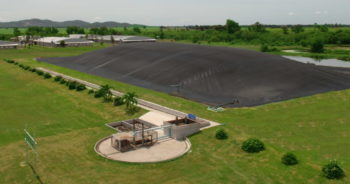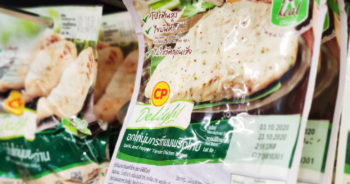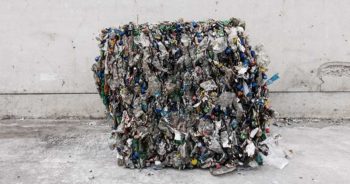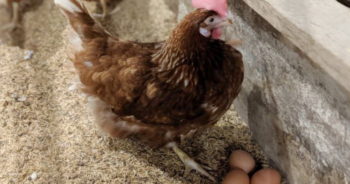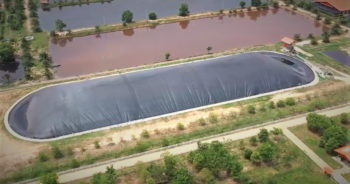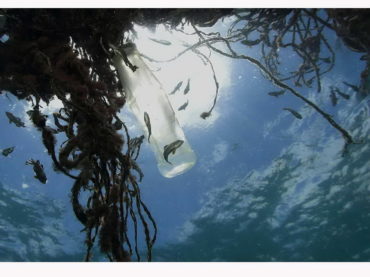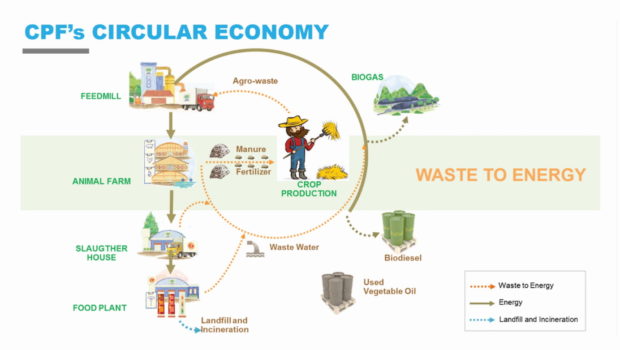
จากการศึกษาปัญหาขยะพลาสติกที่ไม่ได้รับการจัดการไหลทิ้งลงทะเลทั่วโลกถึงปีละกว่า 8 ล้านตัน ซึ่งส่วนใหญ่เป็นขยะพลาสติกประเภทบรรจุภัณฑ์แบบใช้ครั้งเดียวทิ้ง ปัจจุบันคาดว่ามีขยะพลาสติกในทะลถึง 150 ล้านตัน และหากยังเป็นเช่นนี้ต่อไป “คาดว่าในปี 2050 ปริมาณขยะพลาสติกจะสูงกว่าปริมาณปลาในมหาสมุทร”
ไทยเป็นประเทศติดอันดับที่ขยะพลาสติกไหลทิ้งลงในทะเลมากที่สุดในโลก รัฐบาลจึงได้เร่งรัดการดำเนินแผนงานตามโรดแมปการจัดการขยะพลาสติก พ.ศ.2561-2573 มีเป้าหมายลดการใช้พลาสติกแบบใช้ครั้งเดียวทิ้งภายในปี 2565 ด้วยการใช้วัสดุทดแทนที่เป็นมิตรต่อสิ่งแวดล้อม และการนำขยะพลาสติกกลับมาใช้ประโยชน์ 100% ภายในปี 2570 ซึ่งจะช่วยลดปริมาณพลาสติกที่ต้องนำไปกำจัดได้ประมาณปีละ 780,000 ตัน ลดงบประมาณในการจัดการขยะมูลฝอยปีละ 3,900 ล้านบาท รวมทั้งลดการปล่อยก๊าซเรือนกระจกได้ 1,200,000 ตันคาร์บอนไดออกไซด์ โดยเฉพาะกฎเหล็กในปี 2563 คือ ยกเลิกการใช้ถุงพลาสติกหูหิ้วในห้างสรรพสินค้า ซูเปอร์มาร์เกต และร้านสะดวกซื้อ
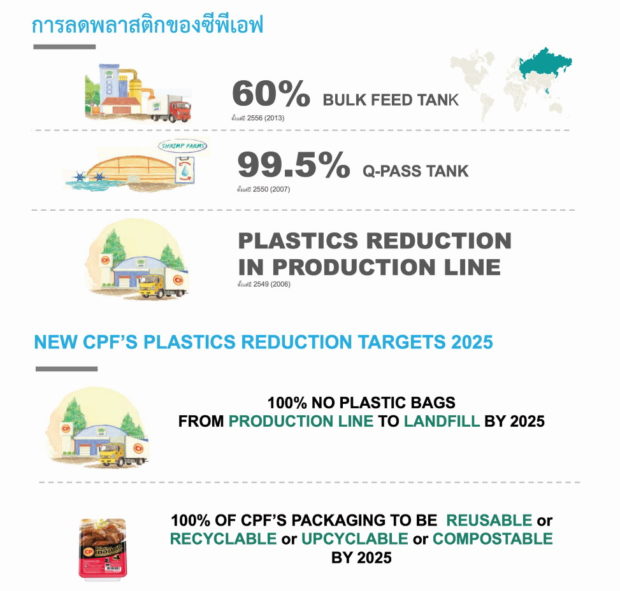
เพื่อร่วมเดินหน้าประเทศไทยในการลดขยะพลาสติก บริษัทเจริญโภคภัณฑ์อาหาร จำกัด (มหาชน) หรือซีพีเอฟ ได้ประกาศนโยบายบรรจุภัณฑ์ที่ยั่งยืน โดยตั้งเป้าหมายบรรจุภัณฑ์พลาสติกสำหรับบรรจุภัณฑ์อาหารทั้งหมดของบริษัทจะต้องสามารถนำกลับมาใช้ซ้ำ (reusable) หรือ นำมาใช้ใหม่ (recyclable) หรือนำไปผลิตเป็นสินค้าใหม่ได้ (upcyclable) หรือสามารถย่อยสลายได้ (compostable) 100% และจะยกเลิกการใช้บรรจุภัณฑ์พลาสติกที่ก่อให้เกิดผลกระทบต่อสิ่งแวดล้อมหรือบรรจุภัณฑ์พลาสติกที่ไม่จำเป็นภายในปี 2568 สำหรับกิจการในประเทศไทย ส่วนกิจการในต่างประเทศจะดำเนินการภายในปี 2573
บริษัทฯ ยังได้กำหนดแนวทางปฏิบัติสำคัญ 4 ข้อเพื่อให้บรรลุเป้าหมายตามนโยบายดังกล่าว คือ 1. ส่งเสริมการใช้วัสดุที่ทดแทนใหม่ได้จากแหล่งที่มีการจัดการอย่างยั่งยืน 2. สนับสนุนการนำบรรจุภัณฑ์ที่ใช้แล้วเข้าสู่กระบวนการนำกลับมาใช้ใหม่ (recycle system) หรือนำบรรจุภัณฑ์ที่ใช้แล้วไปผลิตเป็นพลังงาน (energy recovery) ได้แก่ โครงการรับคืนบรรจุภัณฑ์จากผู้บริโภค (take-back system) 3. เพิ่มสัดส่วนวัสดุรีไซเคิลตามความเหมาะสมในกลุ่มบรรจุภัณฑ์ที่สามารถทำได้ โดยไม่กระทบกับคุณภาพและความปลอดภัยอาหาร 4. มุ่งพัฒนารูปแบบการใช้ซ้ำแทนการใช้ครั้งเดียวสำหรับบรรจุภัณฑ์ที่ใช้ในกระบวนการผลิตหรือการขนส่ง ตามความเหมาะสม
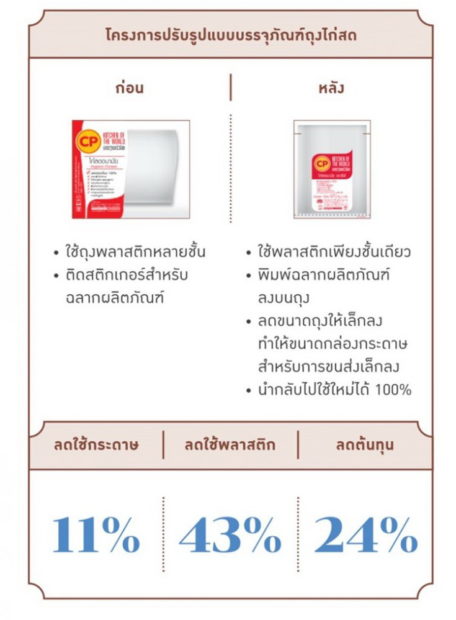
นายวุฒิชัย สิทธิปรีดานันท์ รองกรรมการผู้จัดการอาวุโส ด้านความรับผิดชอบต่อสังคมและการพัฒนาอย่างยั่งยืน ซีพีเอฟ กล่าวว่า บริษัทฯ ลดการใช้พลาสติกในกระบวนการผลิตด้วยการลงทุนและพัฒนานวัตกรรมสีเขียวมาอย่างต่อเนื่อง เพื่อลดขยะพลาสติกในห่วงโซ่คุณค่าทุกสายธุรกิจ ตามแนวทางเศรษฐกิจหมุนเวียน หรือ circular economy ทำให้ในปัจจุบันสามารถลดการใช้พลาสติกได้มากกว่า 28,000 ตัน และลดการปล่อยก๊าซเรือนกระจกได้กว่า 97,000 ตันคาร์บอนไดออกไซด์เทียบเท่า ซึ่งเป็นผลการดำเนินงานของสายธุรกิจต่างๆ ประกอบด้วย สายธุรกิจการผลิตอาหารสัตว์บกได้ใช้ Bulk Feed Tank ทดแทนการใช้ถุงพลาสติกบรรจุอาหารสัตว์ตั้งแต่ปี 2556 จนปัจจุบันทดแทนได้ถึง 62% และขยายผลไปยังกิจการต่างประเทศ ได้แก่ เวียดนาม ลาว กัมพูชา มาเลเซีย ฟิลิปปินส์ อินเดีย ตุรกี และรัสเซีย สายธุรกิจสัตว์น้ำ ได้นำถัง Q-Pass Tank มาใช้บรรจุลูกพันธ์กุ้งเพื่อขนส่งไปยังลูกค้าแทนการใช้ถุงพลาสติก ขณะที่สายธุรกิจผลิตไก่เนื้อครบวงจรใช้กระบะสแตนเลสเพื่อขนย้ายผลิตภัณฑ์ในกระบวนการผลิต
นอกจากนี้ ซีพีเอฟ ยังได้พัฒนาถาดพลาสติกชีวภาพ (bioplastic) จากวัสดุธรรมชาติที่เรียกว่า polylactic acid (PLA) ซึ่งย่อยสลายได้โดยนำมาใช้กับสินค้ากลุ่มหมูสดและไก่สดแช่เย็นตั้งแต่ปี 2558 นับเป็นรายแรกของไทย
“ซีพีเอฟมุ่งมั่นในการใช้ทรัพยากรให้เกิดประโยชน์สูงสุด และสนับสนุนเป้าหมายการจัดการพลาสติกของประเทศไทย และเป้าหมายการพัฒนาอย่างยั่งยืนขององค์การสหประชาชาติข้อที่ 14 ในการอนุรักษ์และใช้ประโยชน์จากทรัพยากรทางทะเลอย่างยั่งยืน” นายวุฒิชัยกล่าว
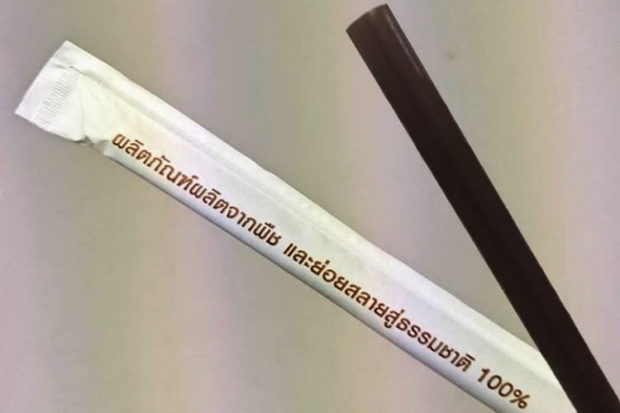
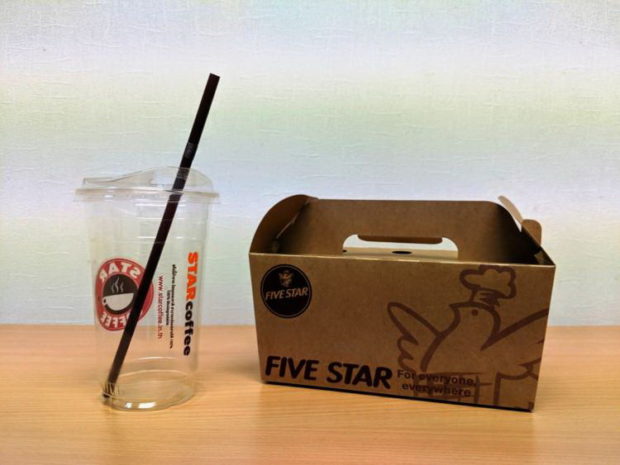
ในส่วนของสายธุรกิจค้าปลีกและธุรกิจร้านอาหาร มีการปรับเปลี่ยนเป็นบรรจุภัณฑ์ที่ย่อยสลายได้ ทดแทนบรรจุภัณฑ์พลาสติก โดยการเน้นการออกแบบใหม่ (redesign) และการใช้ประโยชน์ให้ได้มากที่สุด (maximize) ประกอบด้วย
- บรรจุภัณฑ์ถุงไก่สด ถูกออกแบบใหม่ให้เหลือพลาสติกเพียงชั้นเดียวแทนการใช้พลาสติกหลายชั้น ทำให้ใช้พลาสติกน้อยลงถึง 43% โดยไม่กระทบต่อการรักษาคุณภาพและความปลอดภัยของอาหาร ทั้งยังสามารถนำกลับมาใช้ใหม่ได้ทั้งหมด
- กล่องบรรจุและถาดไข่ไก่สดปลอดสาร CP Selection Cage Free ทำจากกระดาษรีไซเคิล 100%
- เกี๊ยวกุ้ง ตราซีพี ผลิตจากพลาสติกฟู้ดเกรด ปลอดภัยต่อผู้บริโภคและสามารถนำกลับมารีไซเคิลใหม่ได้
- ธุรกิจห้าดาว ร้าน Five Star เปลี่ยนไปใช้กล่องกระดาษแทนถุงพลาสติกสำหรับใส่ไก่ย่างให้กับลูกค้า และเปิดตัว bucket กระดาษเคลือบพลาสติกใส่ไก่ย่างและไก่ทอด ที่ลดการใช้พลาสติกไปกว่า 93%
- ร้านเชสเตอร์ ใช้กล่องกระดาษใส่อาหารและแก้วกระดาษสำหรับอาหารและเครื่องดื่มที่ซื้อกลับบ้าน และอยู่ระหว่างเปลี่ยนมาใช้กล่อง/ถาดใส่อาหารทานเล่น (snack box) ที่ทำจากกระดาษเคลือบ PBS ซึ่งย่อยสลายได้เร็วกว่ากล่องกระดาษเคลือบ PE
- ธุรกิจร้านกาแฟ “สตาร์คอฟฟี่” ใช้ำแก้ว หลอด และฝายกดื่ม ทำจากพลาสติกชีวภาพ (bioplastic) ย่อยสลายได้ 100%
- ซีพี เฟรชมาร์ท ร่วมมือกับ GEPP บริษัทสตาร์ทอัปของไทย ที่เชี่ยวชาญการทำระบบจัดการขยะ เพื่อสร้างชุมชนต้นแบบในการนำขยะพลาสติกไปรีไซเคิล โดยรณรงค์ให้ผู้บริโภคมีส่วนร่วมในการคัดแยกขยะอย่างถูกวิธี และนำขยะพลาสติกแลกไข่ไก่ ควบคู่ไปกับกิจกรรม “ซื้อของน้อยไม่รับถุง” โดยทุกวันพุธงดให้บริการถุงพลาสติกแก่ลูกค้า
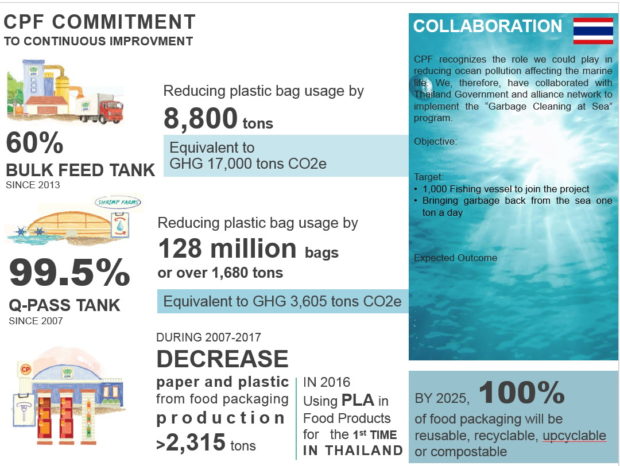
ซีพีเอฟ ในฐานะบริษัทผู้ผลิตอาหารชั้นนำด้วยมาตรฐานโลก มุ่งมั่นร่วมมือกับทุกภาคส่วน ภายใต้แผนยุทธศาสตร์ประเทศไทยระยะ 20 ปี (พ.ศ. 2560-2579) ที่กำหนดยุทธศาสตร์ด้านการสร้างการเติบโตด้วยคุณภาพชีวิตที่เป็นมิตรกับสิ่งแวดล้อม สอดคล้องกับเป้าหมายการพัฒนาที่ยั่งยืนข้อที่ 12 ขององค์การสหประชาชาติว่าด้วยเรื่องแผนการบริโภคและการผลิตที่ยั่งยืน ซึ่งระบบเศรษฐกิจหมุนเวียนเป็นกุญแจสำคัญในการขับเคลื่อนให้บรรลุเป้าหมาย
…
CPF tackles plastic waste with Circular Economy
Each year, more than 8 million tons of plastic are thrown into the ocean, mostly single-use pieces, and accumulated plastic in the ocean is estimated at 150 million tons. If the situation continues, “by 2050 there will be more plastic in the oceans than there are fish”.
Thailand is among the world’s biggest contributors of ocean waste, prompting the government to launch the plastic waste management roadmap (2018-2030) that targets to replace single-use plastic with environmental-friendly materials within 2022 and 100% recycling within 2027. The approaches will decrease plastic to landfills by approximately 780,000 tons a year, cut waste management budgets by Bt3,900 million annually, and reduce greenhouse gases by 1.2 million tons of CO2 equivalents. The tough rule for 2020 is department stores, supermarkets and convenience stores must no longer use plastic bags.
Charoen Pokphand Foods PLC (CPF) marks its collaboration with the plastic waste campaign through a sustainable packaging policy. The goals are CPF’s packaging must be 100% reusable, recyclable, upcyclable or compostable and within 2025, its business units in Thailand will stop using non-environmental-friendly or unnecessary plastic packaging. Overseas business units will follow suit within 2030.
To achieve the goals, CPF outlines 4 main guidelines: 1) Promote substitution items from sustainably-managed sources 2) Through take-back system, support the recycle system for used packaging or the generation of power from the packaging 3) Raise the percentage of recyclable materials in each packaging segment, where possible, without compromising food quality and safety, and 4) develop multiple-use patterns for packaging in the production lines or transportation operations.
Mr. Wuthichai Sithipreedanant, CPF’s senior vice president for corporate social responsibility and sustainable development, said that CPF has continually reduced plastic in the production process through investment in and development of green innovations, to reduce plastic waste throughout the value chain of all businesses as guided by the Circular Economy concept. Plastic consumption has been cut by more than 28,000 tons, reducing greenhouse gases by over 97,000 tons of CO2 equivalents. Contributing to this success are various business operations.
The livestock feed business started replacing plastic bags with Bulk Feed Tank in 2013 and the replacement rate is currently 62%. Such practice is replicated in overseas units in Vietnam, Laos, Cambodia, Malaysia, the Philippines, India, Turkey and Russia. The aquaculture feed business have replaced plastic bags with Q-Pass Tank to transport shrimp larvae to customers. The integrated broiler businesses have replaced plastic bags with stainless steel trucks to transfer products within the production processes.
Last but not least, CPF was the first company in Thailand in 2015 that developed bioplastic trays from natural and degradable polylactic acid (PLA), for fresh pork and frozen chicken products.
“CPF is determined to optimize natural resource consumption. We support Thailand’s plastic waste roadmap and UN Sustainable Development Goal 14: Conserve and sustainably use the oceans, seas and marine resources for sustainable development,” Mr. Wuthichai said.
CPF’s retail and restaurant business also supports degradable packaging, with emphasis on redesign and maximization detailed as follows;
- Fresh chicken bags, formerly made of multi-layered plastic, is redesigned with single-layer plastic, hence reducing plastic by 43% without affecting food quality and safety. The material is also fully recyclable.
- Boxes and trays for CP Selection Cage Free eggs are made of 100%-recycled papers.
- CP-branded wanton packaging is made of food-grade plastic, recyclable and safe for consumers.
- Five Star chain packs roasted chicken in paper boxes instead of plastic bags and plastic-coated paper buckets are used for roasted and fried chicken, reducing plastic use by 93%.
- Chester’s Grill uses paper boxes and glasses for take-away items and is introducing PBS-coated paper Snack Box which degrades faster than PE-coated papers.
- Star Coffee serves with 100% biodegradable glasses, straws and glass covers.
- CP Fresh Mart teams up with Thailand’s startup, GEPP, which specializes in waste management to build an exemplary plastic-recycling community. Consumers are encouraged to take part in proper waste sorting and trade plastic waste with chicken eggs. CP Fresh Mart also launches “Say No to Plastic Bags When Shopping a Few Items” Project and sells products without plastic bags on Wednesdays.
As a leading world-class food producer, CPF is committed to collaborate with all parties under Thailand’s 20-year roadmap (2017-2036) that highlights growth and environmental-friendly wellbeing as well as UN Sustainable Development Goal 12: Responsible consumption and production. The Circular Economy concept is the key towards the goals.
